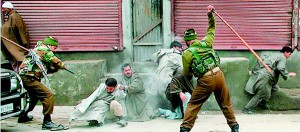Sunday Times 2
Kashmir Black Day to mark Indian Occupation of J and K today
Kashmiris on both sides of the Line of Control and world over will observe October 27 as “Black Day” to mark India’s forcibly occupation of Kashmir 67 years ago.
On October 27, 1947, India invaded Jammu and Kashmir in complete disregard to the Indian Independence Act and Partition Plan in 1947, which stated that the Indian British Colony would be divided into two sovereign states, India, with Hindu-majority areas, and Pakistan, with the Muslim-majority areas of Western provinces and east Bengal.
The Partition Plan had given the then princely states the choice to join either of the two countries on the basis of their geographical situation and communal amity but India forcibly occupied Hyderabad, Junagarh and Jammu and Kashmir. Hyderabad and Junagarh were Hindu-majority states but their rulers were Muslims. Jammu and Kashmir was a Muslim- majority state and had a natural tendency to accede to Pakistan, but its then Hindu ruler, Maharaja Hari Singh, destroyed the future of Kashmiri people by announcing its accession to India under a controversial document (Instrument of Accession).
majority state and had a natural tendency to accede to Pakistan, but its then Hindu ruler, Maharaja Hari Singh, destroyed the future of Kashmiri people by announcing its accession to India under a controversial document (Instrument of Accession).
Many neutral observers like British historian, Alistair Lamb, reject the existence of any such document with the argument that if it were there then Indian government would have made it public either officially or at any international forum. Indian troops, the forces of Dogra Maharaja, and Hindu extremists massacred over three hundred thousand Kashmiri Muslims within a period of two months with the intention to change the demographic composition of the territory.
It is also a reality that the so-called Boundary Commission, headed by British Barrister, Cyril Radcliff, that demarcated partition line between Pakistan and India, played a pivotal role in paving the way for Indian illegal occupation of Kashmir. The Commission split Gurdaspur, a Muslim majority area, under a conspiracy, and handed it over to India, providing it land route to Jammu and Kashmir.
Right from first day, the people of Kashmir did not accept Indian illegal occupation and started an armed struggle supported by a public uprising in 1947. After sensing defeat to its forces, India approached the UN Security Council on January 1, 1948, seeking its help to settle the dispute over Kashmir. Indian invasion and occupation of Kashmir was nullified by the successive UN Security Council resolutions. The Security Council passed two resolutions on August 13, 1948, and January 5, 1949, which were accepted both by Pakistan and India. Through these resolutions, the UN approved a ceasefire, demarcation of the ceasefire line, demilitarisation of the state and a free and impartial plebiscite to be conducted under the supervision of the United Nations. Although one phase of these resolutions (ceasefire and demarcation of ceasefire line) was implemented while demilitarisation of the occupied territory and holding of a plebiscite still remain unimplemented.
The Security Council has explicitly and by implications, rejected India’s claim that Kashmir is legally Indian territory. The Security Council has also rejected the Indian contention that the people of Kashmir have exercised their right of self-determination by participating in the “election” which India has from time to time organised in the Held Kashmir. The 0.2?% turn out during the 1989 “elections” was the most recent clear repudiation of the Indian claim.
The Simla Agreement of 2 July 1972, to which Pakistan also continues to adhere, did not alter the status of Jammu and Kashmir as a disputed territory as it lists “a final settlement of Jammu and Kashmir” as one of the outstanding questions awaiting a settlement.
Every year, the day is marked as Kashmir Black Day by total strike. Different functions, protest demonstrations and anti-India rallies are taken out in the occupied territory, Azad Jammu and Kashmir, and also in the world capitals. This year too, the Kashmiris are observing October 27th as the Black Day to demonstrate to the world that they will never yield to Indian repression. The participants would also pay rich tributes to the martyrs of Kashmir freedom movement for their supreme sacrifices for the cause of freedom of Kashmir from Indian subjugation.
It is incumbent on the international community in general and governing world bodies in particular to intervene and force India to stop shedding innocent Kashmiri blood. Kashmiris should have the right to decide their fate according to the UN resolutions, which were adopted to resolve the issue.
- Pakistan High Commission
comments powered by Disqus
